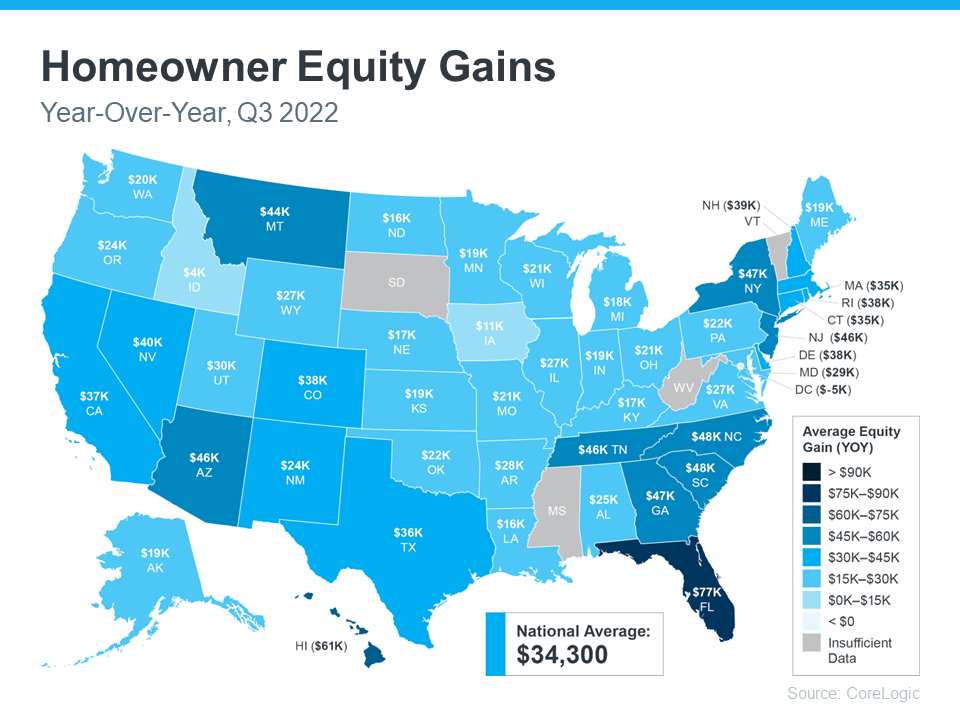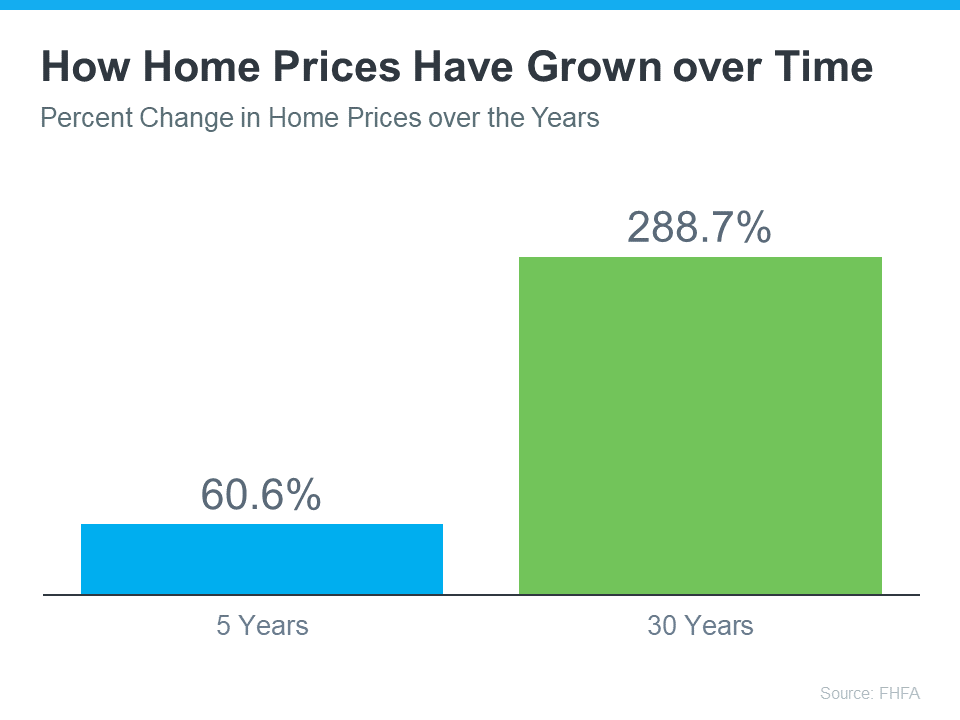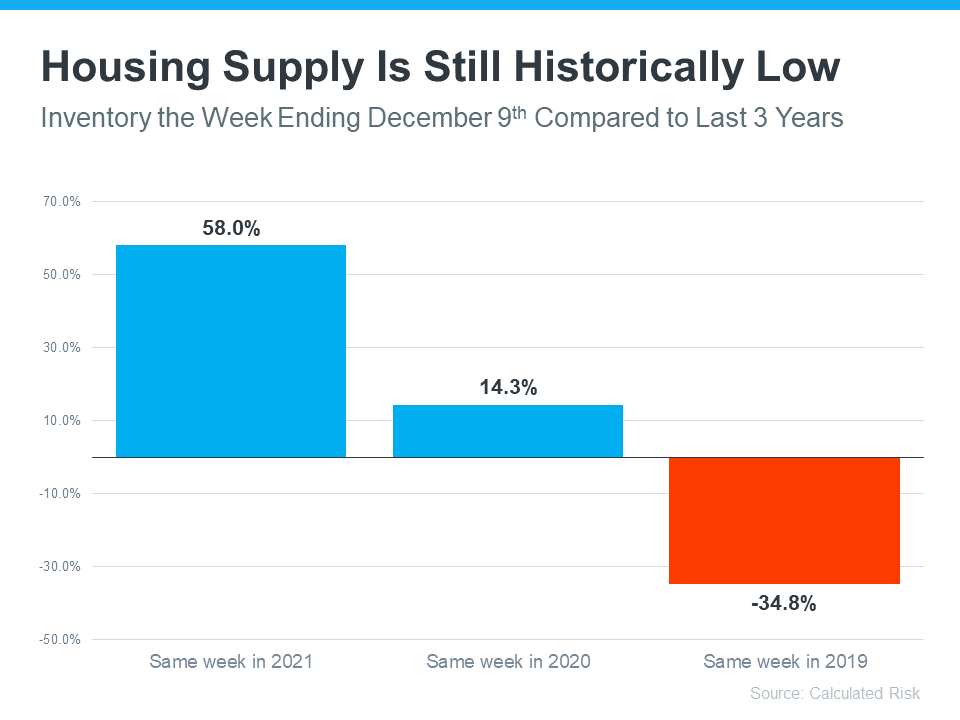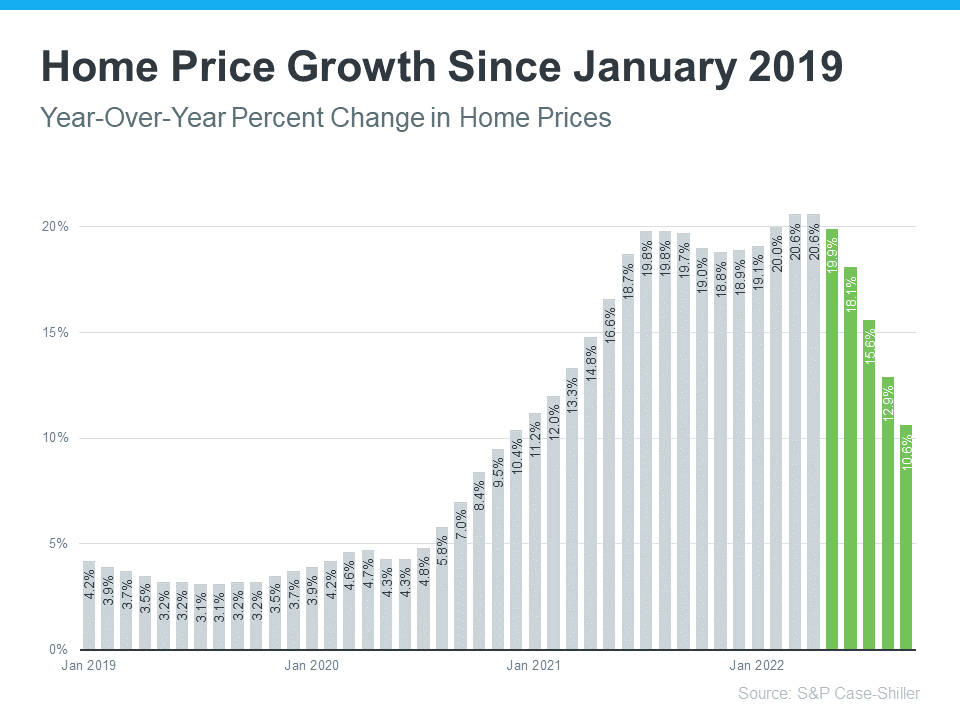Social Links Widget
Click here to edit the Social Media Links settings. This text will not be visible on the front end.
Homeowners Still Have Positive Equity Gains over the Past 12 Months

If you’re a homeowner, your net worth got a big boost over the past few years thanks to rapidly rising home prices. Here’s how it happened and what it means for you, even as the market moderates.
Equity is the current value of your home minus what you owe on the loan.
Because there was a significant imbalance between the number of homes available for sale and the number of buyers looking to make a purchase over the past few years, home prices appreciated substantially.
And while home price appreciation has moderated this year, and even depreciated slightly in some overheated markets, that doesn’t mean you’ve lost all the equity you gained during the pandemic frenzy.
To prove you still have equity you can use, the latest Homeowner Equity Insights from CoreLogic finds the average homeowner equity has actually grown by $34,300 over the past 12 months.
That’s right, despite the headlines, the average homeowner still gained positive equity over the last year in just about every market. While the gains aren’t as dramatic as they were in the previous quarter due to home price moderation, they’re still significant. And if you’ve been in your home for longer than a year, chances are you have even more equity than you realize.
While that’s the national number, if you want to know what happened over the past year in your area, look at the map below from CoreLogic:
Why This Is So Important Right Now
While equity helps increase your overall net worth, it can also help you achieve other goals, like buying your next home. When you sell your current house, the equity you’ve built up comes back to you in the sale, and it may be just what you need to cover a large portion – if not all – of the down payment on your next home.
So, if you’ve been holding off on selling because you weren’t sure what the headlines meant for your bottom line, rest assured you’ve still gained equity in recent years, and it can help fuel your move.
Bottom Line
If you’re planning to make a move, the equity you’ve gained over time can make a big impact. To find out just how much equity you have in your current home and how you can use it to fuel your next purchase, let’s connect.
Planning to Retire? It Could Be Time To Make a Move.

If you’re thinking about retirement or have already retired this year, you may be planning your next steps. One of your goals could be selling your house and finding a home that more closely fits your needs.
Fortunately, you may be in a better position to make a move than you realize. Here are a few things to think about when making that decision.
Consider How Long You’ve Been in Your Home
From 1985 to 2008, the average length of time homeowners typically stayed in their homes was only six years. But according to the National Association of Realtors (NAR), that number is rising today, meaning many homeowners are living in their houses even longer (see graph below):
When you live in a home for a significant period of time, it’s natural for you to experience a number of changes in your life while you’re in that house. As those life changes and milestones happen, your needs may change. And if your current home no longer meets them, you may have better options waiting for you.
Consider the Equity You’ve Gained
Additionally, if you’ve been in your home for more than a few years, you’ve likely built up significant equity that can fuel your next move. That’s because the longer you’ve been in your home, the more likely it’s grown in value due to home price appreciation. Data from the Federal Housing Finance Agency (FHFA) illustrates that point (see graph below):
While home price growth varies by state and local area, the national average shows the typical homeowner who’s been in their house for five years saw it increase in value by over 50%. And the average homeowner who’s owned their home for 30 years saw it almost triple in value over that time.
Consider Your Retirement Goals
Whether you’re looking to downsize, relocate to a dream destination, or move so you live closer to loved ones, that equity can help you achieve your homeownership goals. NAR shares that for recent home sellers, the primary reason to move was to be closer to loved ones. Plus, retirement played a large role for those moving greater distances.
Whatever your home goals are, a trusted real estate advisor can work with you to find the best option. They’ll help you sell your current house and guide you as you buy the home that’s right for you and your lifestyle today.
Bottom Line
Retirement can bring about major changes in your life, including what you need from your home. Let’s connect to explore your opportunities in our local market.
You May Have More Negotiation Power When You Buy a Home Today

Did the frequency and intensity of bidding wars over the past two years make you put your home search on hold? If so, you should know the hyper competitive market has cooled this year as buyer demand has moderated and housing supply has grown. Those two factors combined mean you may see less competition from other buyers.
And with less competition comes more opportunity. Here are two trends that may be the news you need to reenter the market.
1. The Return of Contingencies
Over the last two years, more buyers were willing to skip important steps in the homebuying process, like the appraisal or the inspection, in hopes of gaining an advantage in a bidding war. But now, things are different.
The latest data from the National Association of Realtors (NAR) shows the percentage of buyers waiving their home inspection or appraisal is down. And a recent article from realtor.com points out more sellers are accepting contingencies:
“A year ago, sellers were calling all the shots and buyers were launching legendary bidding wars, waiving contingencies, and paying for homes in cash. But now, the shoe is on the other foot, and 92% of home sellers are accepting some buyer-friendly terms (frequently related to home inspections, financing, or appraisals), . . .”
This doesn’t mean we’re in a buyers’ market now, but it does mean you have a bit more leverage when it comes time to negotiate with a seller. The days of feeling like you may need to waive contingencies or pay drastically over asking price to get your offer considered may be coming to a close.
2. Sellers Are More Willing To Help with Closing Costs
Before the pandemic, it was a common negotiation tactic for sellers to cover some of the buyer’s closing costs to sweeten the deal. This didn’t happen as much during the peak buyer frenzy over the past two years.
Today, data suggests this is making a comeback. A realtor.com survey shows 32% of sellers paid some or all of their buyer’s closing costs. This may be a negotiation tool you’ll see as you go to purchase a home. Just keep in mind, limits on closing cost credits are set by your lender and can vary by state and loan type. Work closely with your loan advisor to understand how much a seller can contribute to closing costs in your area.
Bottom Line
Despite the extremely competitive housing market of the past several years, today’s data suggests negotiations are starting to come back to the table. To find out how the market is shifting in our area, let’s connect today.
Ready To Sell? Today’s Housing Supply Gives You Two Opportunities.

At first glance, the increase in housing supply compared to last year may not sound like good news for prospective sellers, but it actually gives you two key opportunities in today’s housing market.
An article from Calculated Risk helps put the inventory gains the market has seen in 2022 into perspective by comparing it to recent years (see graph below). It shows supply has surpassed 2021 levels by 58%. But the further back you look, the more you’ll understand the bigger picture. And if you go all the way back to 2019, the last normal year in real estate, we’re roughly 35% below the housing supply we had at that time.
Opportunity #1: Take Advantage of More Options for Your Move
If your current house no longer meets your needs or lacks the space and features you want, this inventory growth gives you even more opportunity to sell and move into the home of your dreams. With more houses on the market, you’ll have more to choose from when you search for your next home.
Partnering with a local real estate professional can help you make sure you’re up to date on the homes available in your area. And when you do find the one, a professional can advise you on how to write a winning offer.
Opportunity #2: Sell While Inventory Is Still Low Overall
But again, despite the growth, inventory is still low compared to more normal years, and that isn’t going to change overnight. For you, that means your house should still be in demand among potential buyers if you price it right.
As an article from realtor.com says:
“Today’s shoppers generally have more homes to consider than last year’s shoppers did, but the market is still not back to pre-pandemic inventory levels.”
Bottom Line
If you’re a homeowner looking to sell, you have more homes to choose from and can still sell your house while inventory is low overall. Let’s connect to get started, so you can have the best of both worlds.
What Every Seller Should Know About Home Prices

If you’re trying to decide whether or not to sell your house, recent headlines about home prices may be top of mind. And if those stories have you wondering what that means for your home’s value, here’s what you really need to know.
What’s Really Happening with Home Prices?
It’s possible you’ve seen news stories mentioning a drop in home values or home price depreciation, but it’s important to remember those headlines are designed to make a big impression in just a few words. But what headlines aren’t always great at is painting the full picture.
While home prices are down slightly month-over-month in some markets, it’s also true that home values are up nationally on a year-over-year basis. The graph below uses the latest data from S&P Case-Shiller to help tell the story of what’s actually happening in the housing market today:
As the graph shows, it’s true home price growth has moderated in recent months (shown in green) as buyer demand has pulled back in response to higher mortgage rates. This is what the headlines are drawing attention to today.
But what’s important to notice is the bigger, longer-term picture. While home price growth is moderating month-over-month, the percent of appreciation year-over-year is still well above the home price change we saw during more normal years in the market.
The bars for January 2019 through mid-2020 show home price appreciation around 3-4% a year was more typical (see bars for January 2019 through mid-2020). But even the latest data for this year shows prices have still climbed by roughly 10% over last year.
What Does This Mean for Your Home’s Equity?
While you may not be able to capitalize on the 20% appreciation we saw in early 2022, in most markets your home’s value, on average, is up 10% over last year – and a 10% gain is still dramatic compared to a more normal level of appreciation (3-4%).
The big takeaway? Don’t let the headlines get in the way of your plans to sell. Over the past two years alone, you’ve likely gained a substantial amount of equity in your home as home prices climbed. Even though home price moderation will vary by market moving forward, you can still use the boost your equity got to help power your move.
As Mark Fleming, Chief Economist at First American, says:
“Potential home sellers gained significant amounts of equity over the pandemic, so even as affordability-constrained buyer demand spurs price declines in some markets, potential sellers are unlikely to lose all that they have gained.”
Bottom Line
If you have questions about home prices or how much equity you have in your current home, let’s connect so you have an expert’s advice.
Winter Home Selling Checklist
Some Highlights
- As you get ready to sell your house, focus on tasks that make it inviting, show it’s cared for, and boost your curb appeal.
- This list will help you get started, but don’t forget, a real estate professional will provide other helpful tips based on your specific situation.
- Let’s connect so you have advice on what you may want to do to get your house ready to sell this season.
3 Ways You Can Use Your Home Equity
If you’re a homeowner, odds are your equity has grown significantly over the last few years as home prices skyrocketed and you made your monthly mortgage payments. Home equity builds over time and can help you achieve certain goals. According to the latest Equity Insights Report from CoreLogic, the average borrower with a home loan has almost $300,000 in equity right now.
As you weigh your options, especially in the face of inflation and talk of a recession, it’s important to understand your assets and how you can leverage them. A real estate professional is the best resource to help you understand how much home equity you have and advise you on some of the ways you can use it. Here are a few examples.
1. Buy a Home That Fits Your Needs
If you no longer have the space you need, it might be time to move into a larger home. Or it’s possible you have too much space and need something smaller. No matter the situation, consider using your equity to power a move into a home that fits your changing lifestyle.
If you want to upgrade your house, you can put your equity toward a down payment on the home of your dreams. And if you’re planning to downsize, you may be surprised that your equity may cover some, if not all, of the cost of your next home. A real estate advisor can help you figure out how much equity you have and how you can use it toward the purchase of your next home.
2. Reinvest in Your Current House
According to a recent survey from Point, 39% of homeowners would invest in home improvement projects if they chose to access their equity. This is a great option if you want to change some things about your living space but you aren’t ready to make a move just yet.
Home improvement projects allow you to customize your home to suit your needs and sense of style. Just remember to think ahead with any updates you make, as some renovations add more value to your home and are more likely to appeal to future buyers than others. For example, a report from the National Association of Realtors (NAR) shows refinishing or replacing wood flooring has a high cost recovery. Lean on a local professional for the best advice on which projects to invest in to get the greatest return on your investment when you sell.
3. Pursue Your Personal Goals
In addition to making a move or updating your house, home equity can also help you achieve the life goals you’ve dreamed of. That could mean investing in a new business venture, retiring or downsizing, or funding an education. While you shouldn’t use your equity for unnecessary spending, leveraging it to start a business or putting it toward education costs can help you achieve other lifelong goals.
Bottom Line
Your equity can be a game changer. If you’re unsure how much equity you have in your home, let’s connect so you can start planning your next move.
4 Questions to Ask Your Home Warranty

A home warranty can help you save money—that much you know. But what questions should you ask to get the best one for your needs? We’ve got you covered with the questions below.
Pro tip: Remember that a home warranty is different from your homeowners insurance and works differently to protect your budget.
- What is included in my home warranty?
Every home warranty is different, so it’s important to understand exactly what the standard package covers. For example, some home warranties include washer and dryer coverage in a standard package, while others may offer it as an optional add-on or upgrade.
What upgrades do I need?
Understanding the standard package can help you determine what else you may need and see if those options are available from your home warranty. Ask about different packages, upgrades, and optional add-ons you might choose from, and ensure you understand the details of coverage for each.

- How do I get a contractor for claims?
Depending on the home warranty company you select, there are three possible scenarios:
- The home warranty company sends someone in their network to you.
- The home warranty company provides you a list of people in their network to choose from.
- The home warranty company gives you the freedom to choose any contractor you prefer that is licensed and bonded.
The first two possibilities provide you a contractor that is already working directly with the home warranty company. This means they are already aware of any requirements the home warranty may have, but because the contractor works for your home warranty, they may have limitations to how much they can work toward the benefit of the homeowner.

The third possibility gives you freedom to choose your own contractor, which allows you to:
- Work with a true third-party representative (someone who works for you, not the home warranty company)
- Work with someone you already know and trust
- Schedule them at your convenience, which often results in faster visits
You may need to help your contractor understand the benefit of your home warranty—though your home warranty customer service may be able to assist.
- How do approved claim payments work?
A home warranty can help pay for repairs or replacements for you: The key word here is ‘help’.
- It may not cover the entire cost of repair or replacement. Sometimes it can, and it often saves homeowners hundreds to thousands of dollars on claims. But it’s a good idea to read through your contract and understand what limitations may be present.
- You may have to pay up front and be reimbursed. Your home warranty may indeed have the option to pay your contractor directly for completed services, but it’s a good idea to prepare for the possibility of paying up front and being reimbursed. You might ask, isn’t the whole point of a home warranty to save you money? It still does! Just afterward, instead of before.
Ensure you ask what the payment process looks like, how long it typically takes, and what payment options are available to you.

- What does the claims process look like?
Hopefully you never have to use it. But if (or more likely when) you do, knowing the claims process ahead of time can help you avoid unnecessary stress. We recommend keeping a printed copy of the claims process attached to your fridge or other visible spot so it’s easy to find.
November 2, 2022 | By Cara L. Baker
Handling Holiday Prep

Whether your gift list is a mile long or you’re making a holiday feast large enough to feed the neighborhood, the holidays can be hectic. Want easy ways to avoid getting overwhelmed during the holidays? We’re here to help!
Use the information below to keep your ducks in a row and pull off a phenomenal holiday season with less stress.
The second half of November: Getting started
You may start hearing Christmas music immediately after Halloween, but beginning your prep in the last 10-15 days of the month should give you ample time to prepare. Kick off your end-of-year errands with these tasks to lay the foundation for the weeks ahead.
Pro Tip: You don’t have to get ready for the holidays all alone – save yourself some stress and ask for help! Whether it’s handling daily tasks or helping out on the day of, they’ll probably be happy to oblige.
Thanks-give yourself a list for everything
The first week of holiday prep will focus primarily on planning for Thanksgiving. Make a list of the following so everything and everyone can easily make it to your holiday table.
- Meal ingredients and supplies (ice, a butane lighter for holiday candles, etc.)
- A running guest count, including the number and age of any children attending
- Activities for children, adults, and the whole family!
- Who is responsible for bringing serving spoons, storage containers, drinks, etc.
- Dietary restrictions and mobility concerns
Try seasonal menu planning
This is meal planning with a twist: It focuses on dishes made with foods that are currently and regionally available. Seasonal menu planning offers many benefits, such as:
- Helping you organize what you have to determine what you need
- Focusing on exploring local, in-season ingredients and dishes
- Opening the door for new family traditions
Stock up on holiday greeting cards
Holiday cards of all sorts are already available, which makes it easier to avoid an emergency trip to the nearest gas station or drugstore.
Keep a clear list of greeting card recipients on hand, and purchase cards, e-cards, and stamps early so you can skip long lines at the post office while still sending loved ones sweet thoughts they won’t soon forget.
Give your home a full workup
The last few weeks of the year can be a blur. Set aside a few hours now to give your home a proper deep clean and check off these crucial tasks.
- Organizing your home to get rid of clutter
- Filtering the air flowing through your home so you and your guests can breathe easy
- Checking your furnace so your home can be heated properly
- Preventing cold showers by maintaining your plumbing and your water heater (gas or electric)
- Performing seasonal maintenance on your kitchen appliances
Look through your holiday home décor
Before you display your indoor and outdoor winter decorations, inspect them for any broken or missing pieces, and see if décor used for one part of your home can’t be repurposed elsewhere.
By taking inventory before putting them up, you can make one early trip to get what you need—saving you a last-minute trip for parts, replacements, or batteries.

The week of Thanksgiving: Game time
The guests are arriving, the sound of laughter fills the air, and the table will soon be set. Take these steps for lower stress and more enjoyable holiday meal preparations.
Begin food prep early
A couple days before you start cooking, clean your oven and create a cooking schedule, complete with a list of dishes, their corresponding chefs, and the appliances, pots, and utensils each dish needs.
Pro Tip: Use this same cooking schedule as a template for gatherings later in the holiday season.
To reduce overburdening your kitchen appliances, design the schedule to alternate between hot and cold dishes to allow your oven, stove, and dishwasher to rest.
Start gift shopping
The earlier you start, the less stressful it is – especially if you shop online! To save time and frustration, ask people what they’d like early, and make an organized list like Santa Claus.
Pro Tip: Get a handful of alternative gifts for hotly-requested items. This can help you stick to the budget by preventing overspending on impulse gifts.
The first half of December: You’re on a roll!
You’ve officially made it through Thanksgiving. Now, the focus shifts to celebrations and gifts! Here are a few tips to help you tackle the next couple weeks of holiday events.

Simplify your life with bulk gift ideas
Your seasonal gift giving may include multiple gatherings with a host of family, neighbors, coworkers, and more. Prevent things from getting too complicated or expensive by buying or making gifts like these in bulk.
- Holiday cookies or other desserts
- Coffee
- Infused oils or spice blends
- Candles
- Cold weather accessories, like mittens or ear bands
Make December easier with early holiday shopping
Getting gifts may encourage the whimsy of the season, but handling your Christmas shopping list in the first half of the month gives you more time to sit back and enjoy it.
Having all your gifts purchased and delivered early means you can also avoid longer lines, higher shipping costs, and items being out of stock — not to mention your gifts arriving after Christmas.
Set the tone by trimming the tree
Trimming the tree early in December’s second half makes sure this focal point is ready on time, preventing last-minute frustration from broken ornaments and tangled lights. It’ll be close enough to your main event to stay fresh and allow you to enjoy it.
Create a holiday playlist
Whether your event is an annual gift exchange among friends or a quiet holiday dinner with family, set the mood with the perfect holiday playlist to take your gathering to the next level. You can put together a mix of your family’s favorite songs, or go the quick route by choosing one of several playlists that have already been curated.
Queue it up on the day of the event before guests arrive, and enjoy the ambience it sets for the rest of the night!
Keep your holiday party energy going
Many of us work during the holiday season. Avoid holiday burnout between functions by setting up the essentials for the influx of events.
- Clean your party outfits, shoes, and coats, and keep them in an accessible area of your closet
- Stock your fridge and cupboards with ingredients to make seasonal desserts.
- Wrap your presents as soon as you bring them home, and keep a small box of wrapping supplies where you can wrap presents while you relax.

Keep your home feeling lively with winter foliage
Decorating with winter foliage, like the ones mentioned below, adds a beautiful, natural touch to your indoor winter decorations.
- Winterberries
- Black tulips
- Winter jasmine
- Glory of the snow
To ensure freshness during your holiday gathering, do not bring your seasonal foliage indoors until one to two days before your event. If you’ll be stringing lights near your greenery, make sure your bulbs, cords, and electrical connections are intact and safe!
The second half of December: The home stretch
With just days remaining until the main event, it’s time to focus on the essentials to pull everything together in time. Follow these tips to check off the most important tasks before your guests arrive.
Finish giving your home a winter clean
Once you’ve finished wrapping presents and putting up all the decorations, all that’s left is to get your main living areas presentable. Put on your favorite holiday music and rock out as you give all the rooms your guests will visit a quick winter clean.
Divide preparations for your holiday feast
Break your holiday feast preparations into two lists: One for the night before and one for the morning of. By splitting the work, you reduce stress, frustration, and the likelihood of food ending up burnt, undercooked, or forgotten.
The night before your event, save time by preparing the foods that will keep well overnight, such as potato dishes or cold sides.
The morning of your feast, refer to the cooking assignment list you made earlier in the season, and use modern tech for an easier time before, during, and after preparing the meal.
Bonus tip: Holiday shipping made easy
Though shipping is a whole lot easier than dropping off gifts near and far (sound like someone you’ve heard of?), it can come with its own challenges. Follow the steps below to make holiday shipping a whole lot easier:
- Review your contact info early to avoid gifts getting returned or sent to the wrong address
- Check your local post office or delivery service location’s holiday hours to plan accordingly
- Save yourself gift wrap and tape by knowing which stores offer to wrap and ship presents
Armed with these tips, you’ll have smoother sailing through your end-of-year festivities. Happy holidays!
November 22, 2022 | By Cara L. Baker
Your House Could Be the #1 Item on a Homebuyer’s Wish List During the Holidays
Each year, homeowners planning to make a move are faced with a decision: sell their house during the holidays or wait. And others who have already listed their homes may think about removing their listings and waiting until the new year to go back on the market.
The truth is many buyers want to purchase a home for the holidays, and your house might be just what they’re looking for. Here are five great reasons you shouldn’t wait to sell your house.
1. While the supply of homes for sale has increased this year, there still aren’t enough homes on the market to keep up with buyer demand. As Nadia Evangelou, Senior Economist & Director of Forecasting at the National Association of Realtors (NAR), explains:
“There’s still this gap between demand and supply because we were underbuilding for many years. . . . So now we see demand is slowing, but it still outpaces supply.”
2. Serious homebuyers are out looking right now. Millennials are driving homebuying demand today, and many are eager to make a purchase. Mark Fleming, Chief Economist at First American, explains:
“While not the frenzy of 2021, the largest living generation, the Millennials, will continue to age into their prime home-buying years, creating a demographic tailwind for the housing market.”
3. The desire to own a home doesn’t stop during the holidays. In fact, homes decorated for the holidays appeal to many buyers. Plus, purchasers who look for homes during the holidays are ready to buy.
4. You can restrict the showings in your house to days and times that are most convenient for you. That can help you minimize disruptions, which is especially important this time of year.
5. Rents have skyrocketed in recent years. And, many buyers are looking to escape rising rents and avoid falling into the rental trap for another year. As an article from Zillow says:
“Over the next 12 months, rents are expected to grow more than inflation, the stock market and home values.”
Your home could be their ticket to leaving renting behind for good.
Bottom Line
There are still many reasons it makes sense to list your house during the holiday season. Let’s connect to determine if selling now is your best move.

 Facebook
Facebook
 X
X
 Pinterest
Pinterest
 Copy Link
Copy Link





![Winter Home Selling Checklist [INFOGRAPHIC] | MyKCM](https://files.mykcm.com/2022/11/17130959/Winter-Checklist-MEM-1046x1715.png)







